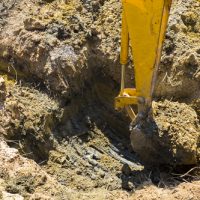 Site grading plays a crucial role in excavation projects, as it is essential for achieving proper drainage, erosion control, and soil stability. Grading refers to the process of shaping and leveling the land before construction begins. It involves removing excess soil, filling in low areas, and creating slopes that promote water runoff. In this blog post, we will discuss the significance of site grading in excavation projects and how grading techniques contribute to the long-term performance of construction projects.
Site grading plays a crucial role in excavation projects, as it is essential for achieving proper drainage, erosion control, and soil stability. Grading refers to the process of shaping and leveling the land before construction begins. It involves removing excess soil, filling in low areas, and creating slopes that promote water runoff. In this blog post, we will discuss the significance of site grading in excavation projects and how grading techniques contribute to the long-term performance of construction projects.
1. Proper Drainage:
Effective drainage is vital for any construction project, as it helps prevent water buildup and potential damage to the structure. Site grading ensures proper drainage by creating slopes and contouring the land in a way that redirects water away from the construction site. By directing water flow away from the foundation and other vulnerable areas, site grading helps prevent water infiltration, basement flooding, and soil erosion. Proper drainage also helps maintain the stability of the soil, reducing the risk of sinkholes and other structural issues.
2. Erosion Control:
Erosion can significantly impact the stability of the soil and compromise the integrity of the construction project. Without proper site grading, water runoff can erode the soil, leading to the loss of topsoil, uneven ground surfaces, and potential damage to nearby structures. Grading techniques, such as creating slopes and installing retaining walls, help control erosion by directing water flow and preventing soil displacement. By implementing erosion control measures during the excavation phase, construction projects can minimize the risk of erosion-related issues and ensure long-term stability.
3. Soil Stability:
A properly graded site ensures that the soil beneath the construction area is stable and capable of supporting the weight of the structure. Soil composition and characteristics vary from site to site, and it is essential to assess and prepare the soil accordingly. Grading allows for the necessary soil compaction, which increases density and stability. This process involves the use of heavy machinery to compact the soil and remove any voids that could cause settlement over time. By properly grading the site and compacting the soil, construction projects can minimize the risk of soil settlement and subsequent structural problems.
4. Long-Term Performance:
Grading techniques contribute significantly to the long-term performance of construction projects. A well-graded site promotes proper drainage, erosion control, and soil stability, ensuring that the structure remains robust and functional for years to come. Proper grading minimizes the risk of water infiltration, mold growth, and foundation issues, all of which can lead to costly repairs down the line. Additionally, a graded site allows for more effective landscaping, as it creates a level surface for planting and ensures that water is evenly distributed to plants. By investing in proper site grading during excavation, construction projects can establish a solid foundation for long-term success.
5. Regulatory Compliance:
Site grading is not only crucial for the performance of construction projects but also for regulatory compliance. Local building codes often dictate specific requirements for site grading, including drainage and erosion control measures. By adhering to these regulations, construction projects can avoid potential fines and delays. Moreover, compliance with site grading standards demonstrates a commitment to environmental stewardship. Proper grading helps prevent soil erosion, which can have detrimental effects on nearby water bodies and ecosystems. By responsibly managing the land through proper grading techniques, construction projects can contribute to sustainable development practices.
Summary
Site grading is of utmost importance in excavation projects to achieve proper drainage, erosion control, and soil stability. By implementing effective grading techniques, construction projects can prevent water buildup, control erosion, and ensure the long-term performance of structures. Moreover, site grading helps comply with regulatory requirements and promotes environmental stewardship. Therefore, investing in proper site grading during excavation is a crucial step towards successful and sustainable construction projects.
Need Concrete Contractors in Sanford, NC?
We are the area’s best concrete company. We specialize in concrete finishing of all types of concrete for residential and commercial customers. Our services include pavement, driveways, footings, sidewalks, decorative concrete, hauling, demolition, and property grading. We’re fully insured. Contact us today for quality workmanship and service.

